
“PLANS FOR THE FUTURE”
A.- ENCUADRE.
B.- OBJETIVOS.
C.- CONTENIDO TEMATICO.
D.- ACTIVIDADES DE CONSOLIDACION.
E.- GLOSARIO
F.- BIBLIOGRAFIA.
G.- APENDICE.
Lengua Adicional al Español (Inglés) es una de las materias que conforman el campo de Lenguaje y Comunicación, forma parte del componente de Formación Básica y se estudia del primero al cuarto semestre. Su inclusión en este campo se debe a la gran importancia que tiene el estudio del idioma inglés en nuestros días. El uso de esta lengua reviste cada vez mayor trascendencia debido, principalmente, a la cantidad de información que se obtiene en este idioma (libros, revistas especializadas, documentales y al enorme ciberterritorio con el que cuenta), al número de hablantes de lengua inglesa en el mundo y a la relevancia económica de las relaciones comerciales entre los países anglófonos y aquéllos que utilizan el idioma inglés como medio de comunicación internacional y el nuestro. El estudio de esta lengua extranjera responde, pues, a la necesidad que tiene el joven bachiller de contar con herramientas que le permitan integrarse de manera armónica, útil y productiva a la nueva sociedad del conocimiento en la que nos encontramos inmersos.
El estudiante:
Describirá planes y acciones a realizar en el futuro, mediante el uso de la estructura gramatical “ be going to” y el uso de las cuatro habilidades comunicativas, mostrando actitudes de
interés y determinación.
1.2. Confirmar información sobre planes.
1. “ PLANS FOR THE FUTURE.”
USO DE TO BE GOING TO
Esta perífrasis verbal nos refiere al uso del tiempo gramatical: FUTURO IDIOMÁTICO.
Que corresponde a la forma idiomática de expresar acciones que ocurrirán en el futuro inmediato.
Este tiempo gramatical es utilizado:
1.-Cuando se hace referencia a un hecho futuro, probable e inevitable.
2.-Para resaltar una acción en el futuro y cuando ya se ha tomado la determinación de hacer algo en particular.
El futuro idiomático se forma con el verbo auxiliar “TO BE” conjugando (am, is, are) mas la forma “going to” que en español corresponde a “ voy a ” mas un verbo en forma simple, mas el posible complemento de la oración.
Modelo Estructural :
I am going to study -voy a estudiar
You are going to study -vas a estudiar
He She is going to study -va a estudiar It |
We are going to study -vamos a estudiar
You are going to study -van a estudiar
They are going to study -van a estudiar
La forma “GOING TO” expresa la intención del sujeto para ejecutar una cierta acción futura.
La intención de usar esta clase de frases es siempre premeditada y por lo general también se da la idea de que alguna preparación para la acción ya ha sido hecha.
Este tiempo se estructura en tres modos gramaticales, de acuerdo como se muestra en la siguiente tabla:.
ESTRUCTURA GRAMATICAL DEL FUTURO IDIOMÁTICO
FORMA AFIRMATIVA
PRONOMBRE / NOMBRE / SUSTANTIVO + PRESENTE TO BE + GOING TO + VERBO PRESENTE + COMPLEMENTO
EJEMPLO :
I am going to teach english language in bachelor´s college Voy a enseñar el idioma inglés en el colegio de bachilleres
FORMA NEGATIVA
PRONOMBRE / NOMBRE / SUSTANTIVO + PRESENTE TO BE + NOT + GOING TO + VERBO PRESENTE + COMPLEMENTO
|
EJEMPLO:
I´m not going to teach english in bachelor´s college No voy a enseñar ingles en el colegio de bachilleres
|
|
FORMA INTERROGATIVA
PRESENTE ( TO BE ) + PRONOMBRE / NOMBRE / SUSTANTIVO + GOING TO + VERBO PRESENTE + COMPLEMENTO + ? |
EJEMPLO :
Am i going teach english in bachelor´s college ? ¿ voy a dar clases en el colegio de bachilleres ? ¿ voy a enseñar inglés en el colegio de bachilleres ? |
RECOMENDACIONES IMPORTANTES :
Con la finalidad de lograr habilidades y aprendizaje de este tiempo gramatical, que nos permite expresar ideas futuras, particularmente planes por realizarse en tiempo posterior al que se escribe o en que es considerada la acción, debemos tener en consideración las siguientes recomendaciones:
- Usar solo signo de interrogación al final de la oración en inglés y usar los dos signos (al principio y al final) al escribir la pregunta en español.
- Cuando la forma interrogativa implique una palabra interrogativa ( what , who, how when, where, why, which), esta deberá ir al inicio de la expresión.
Concentrando estas recomendaciones se tienen a continuación otros ejemplos:
AFIRMACIÓN
|
NEGACIÓN |
INTERROGACIÓN |
Mary is going to wash her car |
Mary isn't going to wash her car |
Is Mary going to wash her car?
When is Mary going to wash the car? |
They are going to go to the bank |
They aren't going to go to the bank |
Are they going to go to the bank?
Why are they going to go to the bank? |
A. EJERCICIO NUMERO 1.
A.1. Instruction 1 : Choose the verb completing the correct answer :
- He is going to ____________ the chair. a. buy
- That girl is going to __________ the house. b. watch
- The boy is going to ____________ because he lost his toy. c. cry
- I'm going to __________ my mother next week. d. see
- My friends are going to __________ the soccer game on T.V. e. dream
- The teacher is going to ___________ you some questions. f. help
- She is going to ________ her clothes in the laundry. g. fix
- My father is going to ___________ a new house. h. ask
- The girl is going to _____________ in her boyfriend. i. wash
- If I can, I'm going to _____________ you. j. do
A.2. Instruction : Choose the verb completing the correct answer:
- She is going to _______ for the exam. a. eat
- My friends are going to _________ English language. b. write
- The soccer team is going to __________ tomorrow. c. begin
- The teacher is going to __________on the blackboard. d. cut
- I'm going to _______ the exam. e. study
- My mother is going to ________ music. f. paint
- The boy is going to ___________a flower for his girlfriend. g. answer
- My father is going to __________ his car. h. learn
- They are going to _____________the homework. i. listen
- We are going to ___________ a torta. j. play
A.3. Instruction : Write am, is, are to complete the following sentences.
- He ______going to seat on the chair.
- That girl______going to sell her house.
- The boy______going to cry because he lost his toy.
- I______going to travel with my mother next week.
- My friends_______going to play the soccer game in the school
- The teacher______going to do some tests with some questions.
- She_______going to wear the clothes in the party.
- My father______going to buy a new house.
- The girl______going to walk to the park with her boyfriend.
- If I can, I______going to visit you.
A.4. Instruction : Make the following sentences to idiomatic future:
- He fixes the chair. _______________________________________
- That girl cleans the house. _______________________________________
- The boy is crying because he lost his toy. _______________________________________
- I see my mother every week. _______________________________________
- My friends are watching the soccer game on t.v . _______________________________________
- The teacher asks you some questions. _______________________________________
- She washes her clothes in the laundry. _______________________________________
- My father buys a new house. _______________________________________
- The girl is dreaming in her boyfriend. _______________________________________
- If I can, I help you. _______________________________________
A.5 Instruction Translate the sentences you has written of the before exercise.
- _______________________________________
- _______________________________________
- _______________________________________
- _______________________________________
- _______________________________________
- _______________________________________
- _______________________________________
- _______________________________________
- _______________________________________
- _______________________________________
Reading activity
A.6. Instruction . Read Jenny's letter and answer the questions
Letter…
Dear Sarah,
I've got some great news. Richard and I are going on holiday for a whole month. Guess where—Hawaiii !!!
We're leaving on 1 st June. We both love swimming, so we're going to stay at a fabulous hotel right next to the beach. I'm going to relax as much as possible because I'm quite tired after working hard all this year.
We're coming back from our holidays on 30 th June and I've got lots of plans for the rest of the summer. First I'm going to work at a café because I want to earns some extra money and buy a new car. I'm also going to join a gym to lose some weight. Finally I want to find a better job in autumn, so I'm going start a computer course.
Oh, I nearly forgot ! On 16 th August we're having a garden party to celebrate Richard's birthday, please try you come. You're welcome to spend the night here.
Well, that's all for now. Hope to see you soon.
Love, Jenny
A.7. Questions:
- Where is Jenny going to spend her summer holiday? _________________________________
- What is Jenny going to do during her holiday? _________________________________
- What are Jenny's plans for the rest of the summer? _________________________________
- When is Jenny having a party? Why? _________________________________
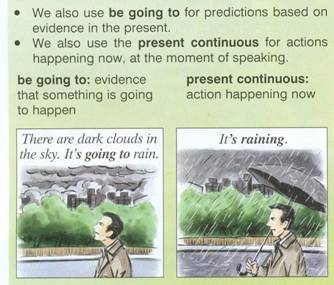
B.- EJERCICIO NUMERO 2.
B.1. Instruction: W rite am, is or are to complete the following sentences
- They _______going to visit the city next month.
- They ________going to live in Mexico city .
- He______going to look at the cinema.
- My cousin_____going to say hello.
- She_______going to sit her child on the chair.
- The chemistry teacher______going to teach math now.
- We_______going to see our family on vacation.
- I_______going to walk in the park at night.
- Raul_______going to work in the factory.
- Raul and carlos______going to have a new job.
B.2 Instruction : Choose the verb completing the correct answer
- They are going to___________ this city next month. a. dance
- They are going to ___________ in Morelia city. b. sit
- He's going to _____________ at the cinema. c. live
- My cousin is going to ____________ in the party. d. look
- She is going to _____________ her child on the chair. e. teach
- The chemistry teacher is going to __________ math now. f. have
- We are going to ___________ our family on vacation. g. walk
- I'm going to _______________ in the park at night. h. visit
- Raul is going to _____________ in the factory. i. see
- Raul and Carlos are going to __________ a new job. j. work
B.3 Instruction : Make the following sentences to idiomatic future and translate each one sentences :
1. They visit the city next month. _______________________________________
_______________________________________
2.-They live in México city . _______________________________________
_______________________________________
3.- He is looking at the cinema. _______________________________________
_______________________________________
4.- My cousin says so much riddles _______________________________________
_______________________________________
5.- She sits her child on the chair. _______________________________________
_______________________________________
6.- The chemistry teacher teaches math now. _______________________________________
_______________________________________
7.- We see our family on vacation. _______________________________________
_______________________________________
8.- I walk in the park at night. _______________________________________ _______________________________________
9.- Raul works in the factory. _______________________________________
_______________________________________
10.- Raul and Carlos have a new job. _______________________________________
_______________________________________
B.4. Instruction : answer the follow questions:
- Who is going to visit the city next month? ( ) they are
- Where is she going to live next years? ( ) in the school
- Who is going to look at the cinema? ( ) because we are going to enjoy
- Why is he going to say nice riddles? ( ) she is
- Who is going to sit her child on the chair? ( ) In México city
- Who is going to teach math now? ( ) at night
- Who are going to see their family on vacation? ( ) they are
- When am i going to walk in the park? ( ) the chemistry teacher
- Where is going to work Raul? ( ) Raul and Mary
- Why are you going to have a new job? ( ) because I need too money
B.5 Instruction . Write a sentence about each picture .
Use be going to Use present continuous
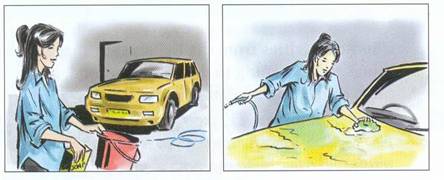
__________________________ ________________________
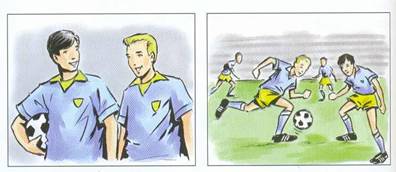
__________________________ ________________________
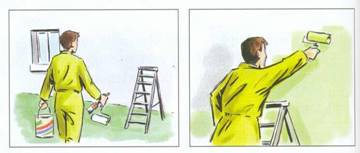
__________________________ ________________________
1.2 “Confirmar información sobre planes”.
Uso de: “ Yes/ no questions.”
“ Wh – questions” .
“Next year, month”
Question Words
What ...? |
¿Qué...? |
Where...? |
¿Dónde...? |
When...? |
¿Cuándo...? |
Who...? |
¿Quién...? |
Whose...? |
¿De quién...? |
How...? |
¿Cómo...? |
Why...? |
¿Por qué...? |
Which...? |
¿Cuál...? |
-FUTURO SIMPLE_
Normalmente es utilizado:
1 Para expresar una previsión y para prometer algo.
2 Para referirse a decisiones premeditadas o para expresar una relación ante algo que se acaba de decir o ante algún hecho que acaba de ocurrir.
3 En combinación con el futuro idiomático o alternadamente, se utiliza para evitar la repetición o la monotonía en el dialogo.
Se estructura este tiempo gramatical de la siguiente manera:
FORMA AFIRMATIVA
|
AUXILIAR WILL + PRONOMBRE/ NOMBRE / SUSTANTIVO + VERBO PRESENTE + COMPLEMENTO + ? |
EJEMPLOS
I will teach english in bachelor´s college ¿ Enseñaré Inglés en el colegio de bachilleres ?
|
FORMA NEGATIVA
|
PRONOMBRE / NOMBRE / SUSTANTIVO + WON´T + VERBO PRESENTE + COMPLEMENTO
|
EJEMPLOS
I won´t teach english in bachelor´s college No enseñare ingles en el colegio de bachilleres WON´T = WILL NOT
|
FORMA INTERROGATIVA
|
AUXILIAR WILL + PRONOMBRE / NOMBRE / SUSTANTIVO + VERBO PRESENTE + COMPLEMENTO + ?
|
EJEMPLOS:
Will I teach English in bachelor´s college? ¿ enseñaré inglés en el colegio de bachilleres? |
C. EJERCICIO NUMERO 3
C.1. Instruction :
Complete in the blanks with the verb in parentheses in future tense. you see for
the examples
Example: He ( will call ) you tomorrow. (Call)
1) They _______________ us in the morning. (See)
2) I __________________ you that money tomorrow. (Give)
3) She ________________ you with that work. (Help)
4) Mary _______________ off the table right away. (Clean)
5) The stores ___________ early today. (Close)
6) I __________________ the tip. (Leave)
7) Helen ______________ the book which you need. (Find)
8) You _______________ a lot of money there. (Spend)
9) John _______________ well in that job. (Do)
10) The wind ___________ that sign down. (Blow)
11) We _______________ you in Grand Central Station. (Meet)
12) I _________________ the bill. (Pay)
13) You ______________ a great deal in that course. (Learn)
14) We _______________ in Mexico about a month. (Remain)
15) His secretary says that he __________ back at six O'clock. (Be)
16) You ______________ a lot of money there. (Spend)
17) I _________________ you a cup of tea. (Make)
18) I'm sure you ________ the book you lost. (Find)
Algunos ejemplos utilizados a continuación, nos muestran la aplicación de de la perífrasis going to y will , que representan los dos tiempos gramaticales del futuro más usuales, no obstante cada uno de ellos tiene su caracterización muy particular, como se observa en ejemplos anteriores y en la la tabla siguiente.
Examples:
INTERROGACIÓN |
RESPUESTA |
Is Mary going to wash her car?
Are they going to go to the bank?
|
Yes she is No she isn't
Yes they are No they aren't |
When is Mary going to wash the car? |
She is going to wash it next Monday She is g0ing to wash the car next Monday |
Why are they going to go to the bank? |
Because they haven't money Because they need money |
Where will be the party
Where is you going to see to your sister |
It will be in my father's house
I'm going to see her in the cinema |
How will be your next holiday?
How is he going to travel to China ? |
I would like visit my grandparents in Canada
He is going to take a aeroplane to fly there |
C.2.Instruction :
Invent and answer the following questions:
• Who is going to fix the chair? ___________________________________________
• Where will be next birthday party? ___________________________________________
1.- Why is the boy crying? ___________________________________________
2.- When am I going to see my mother? ___________________________________________
3.- Who is going to watch the soccer game.? ___________________________________________
4.- Where will be the next test? ___________________________________________
5.- When is your birthday ? ___________________________________________
6.- What are you going to buy in that supermarket? _____________________________________
7.- Whose will be these books? ___________________________________________
8.- When are you going to help to me? ___________________________________________
9.- Are you going to take vacation next summer? ________________________________________
C.3. Instruction
Answer matching the following questions:
1.- Who is going to erase the blackboard? ( ) because I'm thirsty
2.- Who are going to use new uniforms? ( ) Luis is
3.- What will happen if they study? ( ) a door for my room
4.- Where am I going to sleep? ( ) in that hotel
5.- Why is she going to take medicine? ( ) the soldiers are
6.- Why am I going to drink some water? ( ) next saturday
7.- When are you going to travel to Acapulco ? ( ) to the bookstore
8.- Where are we going to go tomorrow? ( ) near the river
9.- What is the carpenter going to make? ( ) because she is sick
10.- Where is he going to build the house? ( ) learn and get good grades
Reading and comprehensive exercise .
C.4. Instruction .
Read carefully the following predictions text:
"PREDICTIONS”From 2000-2001
Computer, will be used as automatic translators of text by international bodies.
By 2002
Spanish (along with English) will become an official language in the u.s.
Winter 2003
A long-lasting temperature inversion over the valley of México will produce levels of pollution in México city higher than any recorded history. Thousands of people will die form respiratory complications and as many as two million more will become seriously ill.
By 2005
The beginning of planetary colonization will be the main theme of the 21 st . Century.
By 2006
The nations of the world will meet in a global congress to seriously attack the problems of population, food and energy.
By 2008
A cure for cancer will be discovered.
There will be local control of weather conditions.
Widespread colonization of the desert will begin.
We will use nuclear power to make hydrogen from water and automobiles and spacecraft will be propelled by hydrogen.
By 2009
People will be able to walk across the Atlantic Ocean . There will be any cities on the sea linked by flexible bridges.
By 2010
The use of rockets for private and commercial transportation to terrestrial and extraterrestrial locations will be possible, both technically and economically.
By 2010
World population will peak at something like seven million people. Fifty thousand people will live and work in space.
Summer 2012
The long awaited and feared “great earthquake” will finally strike northern California with unimaginable losses of life and property in the San Francisco bay area.
C.5. Instruction :
According to the text, answer the following questions:
1 What will happen by the year 2000? ____________________________________________
2. How will computers be used in the near future? ____________________________________________
3. When will planetary colonization begin? ____________________________________________
4. How people be able to across the Atlantic ? ____________________________________________
5. What will be the purpose of a global congress? ____________________________________________
D. EJERCICIO NUMERO 4.
D.1. Instruction.
In accordance with the text predictions you can write “true” or “false”
- The use of rockets for transportation will be possible by 2010. ______________
- México City wi ll become the healthiest place in the world to live in because its pollution level will decrease drastically._______________
- By 2010 the worlds population won't be over two million. _______________
- Both English and Spanish will be official languages in the United States . _________
- In the 21 st . Century, computers won't be important any more. ____________
D.2. Instruction :
Change to the future tense the following sentences. Be carefully when you write the verb.
1. He studies in this class. ______________________________________
2. She works in this office. ______________________________________
3. You speak English well. ______________________________________
4. I come to the lesson on time. ______________________________________
5. They walk to their work. ______________________________________
6. He brings his friends to the lesson. ______________________________________
7. He opens the door for us. ______________________________________
8. She plays the violin well. ______________________________________
D.3. Instruction :
Invent and answer the following questions:
- Who will visit you next month? ______________________________________
- When are you going to live in Morelia city? ______________________________________
- How are you is going to wear for the graduation? ______________________________________
- Who will you work to made the homework with? ______________________________________
- Why is going to teach math our sciences teacher ? ______________________________________
- Where is going to work your cousin? ______________________________________
- Why are you going to study? ______________________________________
- What are my friends going to learn this English class? ______________________________________
- What is your mother going to do next weekend? ______________________________________
- What will happen if you study very hard? ______________________________________
- What will the carpenter make in your house? ______________________________________
- What will you need tomorrow for the party? ______________________________________
- Hacer planes a futuro.
- Repaso de los puntos anteriores.
- Repaso del vocabulario de la unidad
Hacer planes futuros implica manejar ideas o diálogos en cualquiera de los diferentes tiempos del futuro
Examples
QUESTION ANSWER
What are you going to do in your job? I am going to teach English in this college
Voy a enseñar inglés en este colegio
What will you study that school? I will study Languages
I'll study chemistry engineer
How will be our new house? Our new house will be bigger than other one we have now
De acuerdo entonces a los diferentes modos en que es estructurado los tiempos gramaticales del futuro y a razón de complementar satisfactoriamente los contenidos del programa, será considerado a continuación ideas que manejan la negación e interrogación de esa gramática idiomática del inglés.
EJERCICIO NUMERO CINCO
Instruction 1:
Change the following sentences to negative and interrogative form; you can read for the examples.
Example: They are going to wait for us. AFIRMACIÓN
A). They are not going to wait for us. NEGACIÓN
They aren't going to wait for us.
B) Are they going to wait for us? INTERROGACIÓN
1) John is going to take a vacation.
a) ________________________________________________
b) ________________________________________________
2) He is going to start working there on Monday.
a) ________________________________________________
b) ________________________________________________
3) They are going to pay a good salary.
a) ________________________________________________
b) ________________________________________________
4) They are going to move to California next month.
a) ________________________________________________
b) ________________________________________________
5) Henry is going to travel to Europe on his next vacation.
a) ________________________________________________
b) ________________________________________________
6) We are going to sit outdoors for a while.
a) ________________________________________________
b) ________________________________________________
7) They are going to spend the weekend in Connecticut .
a) ________________________________________________
b) ________________________________________________
8) He is going to put all his money in stocks and bonds.
a) ________________________________________________
b) ________________________________________________
9) George is going to have a tooth pulled tomorrow.
a) ________________________________________________
b) ________________________________________________
10) I am going to read some of my own poems for you.
a) ________________________________________________
b) _______________________________________________
Instruction 2.
Choose words from the vocabulary list to fill in the gaps, then use them to make sentences in future tense.
Vocabulary : Computer, great, go, earn, work, join, lose, fabulous
Sentences
1. _________________ news ___________________________________________
5. to _________________ money ___________________________________________
2. to ___________ on holiday ___________________________________________
6. to _________________ a gym ___________________________________________
3. a ____________ hotel ___________________________________________
7. to _________________ weight ___________________________________________
4. to ____________ hard ___________________________________________
8. a ________________ course ___________________________________________
Instruction 3 :
Complete the sentences in idiomatic future. Use the verbs from the list.
- My mother can't go because she __________________ the house. study
- I'm hungry _____________________ in my house. clean
- The teacher _______________________ English language. sleep
- If you study, you _____________________ and pass the exam. be
- I _________________ from 8 p.m. to 8 a.m. every day. teach
- The red cross ____________________ in the war. learn
- The soccer players _______________________ next sunday. find
- I'm ___________________ medicine. begin
- He's looking for money, he ____________________it if he works. play
- I'm ________________ class in September. eat
Instruction 4 :
Translate to English the following sentences .
• ¿ Tu vas a ir a los Estados Unidos el mes próximo? ___________________________________
• Nosotros vamos a comprar una casa en una ciudad lejana. ___________________________________
• Yo iré de compras por la tarde. ___________________________________
• ¿Ellos comerán pan durante el desayuno? ___________________________________
• Caty va a hacer ejercicio en el jardín. ___________________________________
• Bob no usará libros de la biblioteca. ___________________________________
• Nosotros estaremos viviendo en Japón el próximo año. ___________________________________
• Ustedes no bailaran en la fiesta. ___________________________________
• Bob and Caty estarán temblando de frío en el mar. ___________________________________
• ¿Carol estará de viaje la semana que viene? ___________________________________
• ¿Qué vas a estudiar en la Universidad? ___________________________________
• Ellos no subirán de peso en los próximos años ___________________________________
Instruction 5.
HOROSCOPOS READING
Read the horoscopes and answer the questions. For some questions, there is more than one correct answer.
Which horoscope says:
• You'll receive a letter from a friend?._____________________________________
• You'll get an invitation/invitations? _____________________________________
• You'll have health problems? _____________________________________
• You'll get a lot of money? _____________________________________
• You'll have problems with someone in your family? __________________________
• You'll have lucky week? _____________________________________
• You'll have a difficult week? _____________________________________
• You'll get some a good news in a letter? ___________________________________
• You'll go on a short journey this week? ____________________________________
• You won't have a good week? _____________________________________
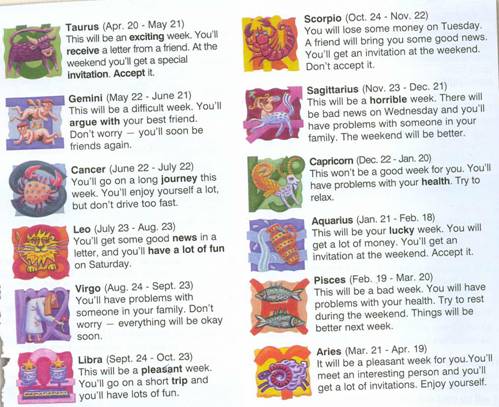
EJERCICIO NUMERO SEIS.
Instruction 1:
Translate the following story and underline the phrases you find in future tense.
THE CAR OF THE FUTURE
A pessimist is a person who always expects bad things to happen. Pessimists think that today's cars are in trouble because they use too much gas. They say the car of the future will be much smaller. The car of tomorrow will have no heater and no air conditioning. It'll have no radio and no lights. Tomorrow's car will be an open air car with no doors and windows. It won't need a pollution control system because it won't use gas. In fact, drivers will push this new car with their feet. Very few people will be killed in accidents, because the top speed will be five miles per hour. However, pessimists warn us not to ask for pretty colours, because the car will come in gray only.
Instruction 2:
Read and answer the sentences that you will find them after the story.
THE WEATHER
Here is the latest weather report from Channel Fifteen. First the national picture. The Pacific Coast will have strong winds which might bring the rain from Northern California through coastal regions of the Pacific Northwest . In the Rockies there will be heavy snow. It will be cold and dry in the Midwest , with cloudy skies in the afternoon. Over the northeast, where there will be clear skies this morning. There might be some rain in the afternoon, but it won't be heavy. You can't expect temperatures in the high 30s to low 40s. Finally, here in the southeast, it will be warm and sunny in the morning, with a 40% chance of raining in the early afternoon. There will be rain in the evening, and there might be thunderstorms at that time.
Questions and Answers
- What will the weather be like in the Pacific Coast ?
It will be windy.
- Where will be heavy snow?
In the Rockies .
- What will the weather be like in the Midwest ?
It will be cold and dry .
- Will be cloudy skies in the afternoon there?
Yes, it will .
- What will happened over the northeast?
There will be clear skies this morning.
- Will the rain be heavy?
No, it won't .
- What will the weather be like in the southeast?
It will be warm and sunny in the morning .
- Will be rain in the evening there?
Yes, it will .
VOCABULARY |
||||
language |
idioma |
|
tonight |
esta noche |
tomorrow |
mañana |
|
trip |
viaje |
pulled |
careado |
|
week |
semana |
weekend |
fin de semana |
|
travel |
viajar |
city |
ciudad |
|
factory |
fabrica |
next |
próximo |
|
chemistry engineer |
ingeniero químico |
bookstore |
librería |
|
health |
salud |
world |
mundo |
|
population |
población |
bay area |
area de la bahía |
|
summer |
verano |
sea |
mar |
|
bridge |
puente |
bank |
banco |
|
grandparents |
abuelos |
news |
noticias |
|
library |
biblioteca |
vacation |
vacaciones |
|
weather |
clima |
riddles |
adivinanzas |
|
pollution |
contaminación |
space |
espacio |
|
university |
universidad |
park |
parque |
|
future plans |
planes futuros |
also |
también |
|
river |
rio |
job |
trabajo |
|
supermarket |
supermercado |
supermarket |
supermercado |
|
aeroplane |
avión |
toy |
juguete |
|
too money |
mucho dinero |
party |
fiesta |
|
weight |
peso |
autumn |
otoño |
|
college |
colegio |
nearly |
cercano, casi |
|
toy |
juguete |
game |
partido, juego |
|
boyfriend |
novio |
clothes |
ropa |
|
girlfriend |
novia |
laundry |
lavandería |
|
holiday |
vacaciones |
garden |
jardín |
|
whole |
Entero |
lot of |
Mucho, mucha |
|
|
|

.
A.- ACTIVIDADES DE CONSOLIDACION.
A.1.GRAMATICALES
Perífrasis verbal to be going to.
B.2.LEXICALES
-Vocabulario relacionado con: la compra de objetos y la visita a lugares diversos (restaurantes, museos, playas, etc.)
C.3. RETÓRICO FONÉTICOS
Forma reducida de going to.
D.4. CULTURALES
Señalar que los anglófonos, principalmente los norteamericanos, hablan sobre planes que tienen que ver con la adquisición de bienes materiales.
1.2. Actividades para Confirmar información sobre planes .
- FUNCIONALES
Solicitar y dar información.
- LINGÜÍSTICOS:
- GRAMATICALES
Yes/ no questions.
Wh – questions .
- LEXICALES
Expresiones de tiempo. Next year, month, etc.
- RETÓRICO FONÉTICOS
Entonación enfática para expresar determinación.
1.3. Actividades sobre “Mi agenda.”
- FUNCIONALES
Hacer planes.
- LINGÜÍSTICOS:
- GRAMATICALES
Repaso de los puntos anteriores.
- LEXICALES
Repaso del vocabulario de la unidad.
Brewster, S. et al . Skyline 1 y 2 Oxford. MacMillan. 2001.
Diccionarios Longman y Oxford Básicos.
Dos Santos, Manuel . Super Goal 1 y 2 México. McGraw-Hill. 2001.
Evans, V. And Neil O Sullivan. Click on 1 y 2 . Newsbury, Express Publishing. 2001.
Jenkins, R. And Staci Lyn Sabbagh. Stand Out 1 y 2 . Boston , Thompson Heinle. 2002.
Richards, Jack. New Interchange 2 y 3 . Cambridge University Press. 1999.
Material didáctico para la asignatura de Inglés II elaborado por Gema Alfaro Montañez. 2005
Otras formas de futuro
- Se puede utilizar el "present simple" para describir una acción en el futuro que está totalmente planeada:
Tomorrow I fly to Madrid . |
Mañana vuelo a Madrid (la acción ya esta planeada y decidida) |
Next week I start my course. |
La próxima semana empiezo mi curso |
- También se utiliza el "present continuous" para expresar una acción que se va a desarrollar en un futuro cercano y que también está planeada. En estas oraciones hay que mencionar el tiempo futuro en el que la acción tendrá lugar, ya que de otro modo se entendería que la acción se está desarrollando en el presente:
Tonight I am having a party. |
Esta noche voy a celebrar una fiesta |
Next Week We are visiting you. |
La próxima semana te visitaremos |
- Otra fórmula de expresar el futuro en ing lés es con la forma "to be going + infinitivo". Se utiliza para aquellas acciones que el sujeto ha decidido realizar y sobre las que normalmente ha hecho ya ciertas preparaciones al respecto:
I am going to buy a house. |
Yo me voy a comprar una casa (estoy totalmente decidido, ya estoy buscando casa, ahorrando, etc.) |
Next summer I am going to study in England . |
El próximo verano, voy a estudiar a Inglaterra (ya me estoy moviendo al respecto, estoy buscando escuela, etc.) |